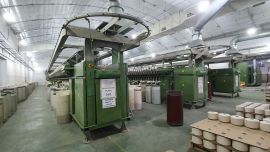Lawmakers in Formosa on Thursday declared the need for a “comprehensive reform” of the provincial Constitution, a move that could pave the way for a ninth consecutive election of its longstanding governor.
Gildo Insfrán, 73, has ruled the northern border province for more than a quarter of a century, having first assumed office in 1995. Another term in power would take him past the 30-year mark.
On Thursday, in a vote that drew criticism from Insfrán’s opponents, lawmakers in the provincial lower house voted 20-10 in favour of a bill stating that elections for constitutional assembly members should be called within 12 months.
Following the approval, Insfrán must call elections for the assembly members who will draft the new constitution.
The draft amendment to the provincial constitution states that its objective is to "strengthen the representative, republican and democratic system" through "new regulations on the political rights to elect and be elected." That process would then end in reform, which analysts say would open the door to Insfrán’s potential re-election.
The vote came in response to a resolution from Argentina’s Supreme Court stating that it would issue an opinion within 60 days in response to a writ from Formosa Senator Francisco Paoltroni seeking to block indefinite re-election.
Insfrán has been the top man in Formosa for eight consecutive terms and Paoltroni’s is not the first complaint against his attempts to stay in power.
Two other complaints, filed by the Confederación del Frente Amplio Formoseño and opposition politician and former Formosa judge Fernando Carabajal, are also with the courts.
Several cases filed by opposition leaders over Insfrán's re-election are pending.
The Supreme Court is expected to rule against indefinite reelection, declaring it unconstitutional. Similar rulings have been issued for provincial elections in the provinces of San Juan, Tucumán and Río Negro.
Opponents of the Peronist leader’s long reign in power in Formosa argue that the “express” reform of the provincial constitution is just a smokescreen to extend the governor's term, part of a bid to head off the Supreme Court’s anticipated ruling.
UCR provincial deputy Agostina Villaggi criticised the initiative Thursday, stating the move is part of a bid to keep “the same official staying in power without limitations.”
According to Villaggi, the opposition was willing to support a reform push based on consensus, involving all political and social sectors, with an eye to improving conditions in the province.
Instead of that, she alleges, the sole purpose is to secure Insfrán’s position for years to come.
Possessing a record which no provincial leader in Argentine history or worldwide can dispute, only a handful of current heads of state worldwide had longer terms.
Following his second re-election as governor in 2003, a vote in which he received over 60 percent of the vote, Insfrán found himself with sufficient political capital to embark on a reform of the provincial Constitution, permitting him indefinite re-election.
Further re-elections followed in 2007, 2011, 2015 and 2019.
According to the INDEC national statistics bureau, Formosa is one of the poorest provinces in the country, with 57 percent of households and 67.6 percent of people below the poverty line.
– TIMES/NA



















Comments